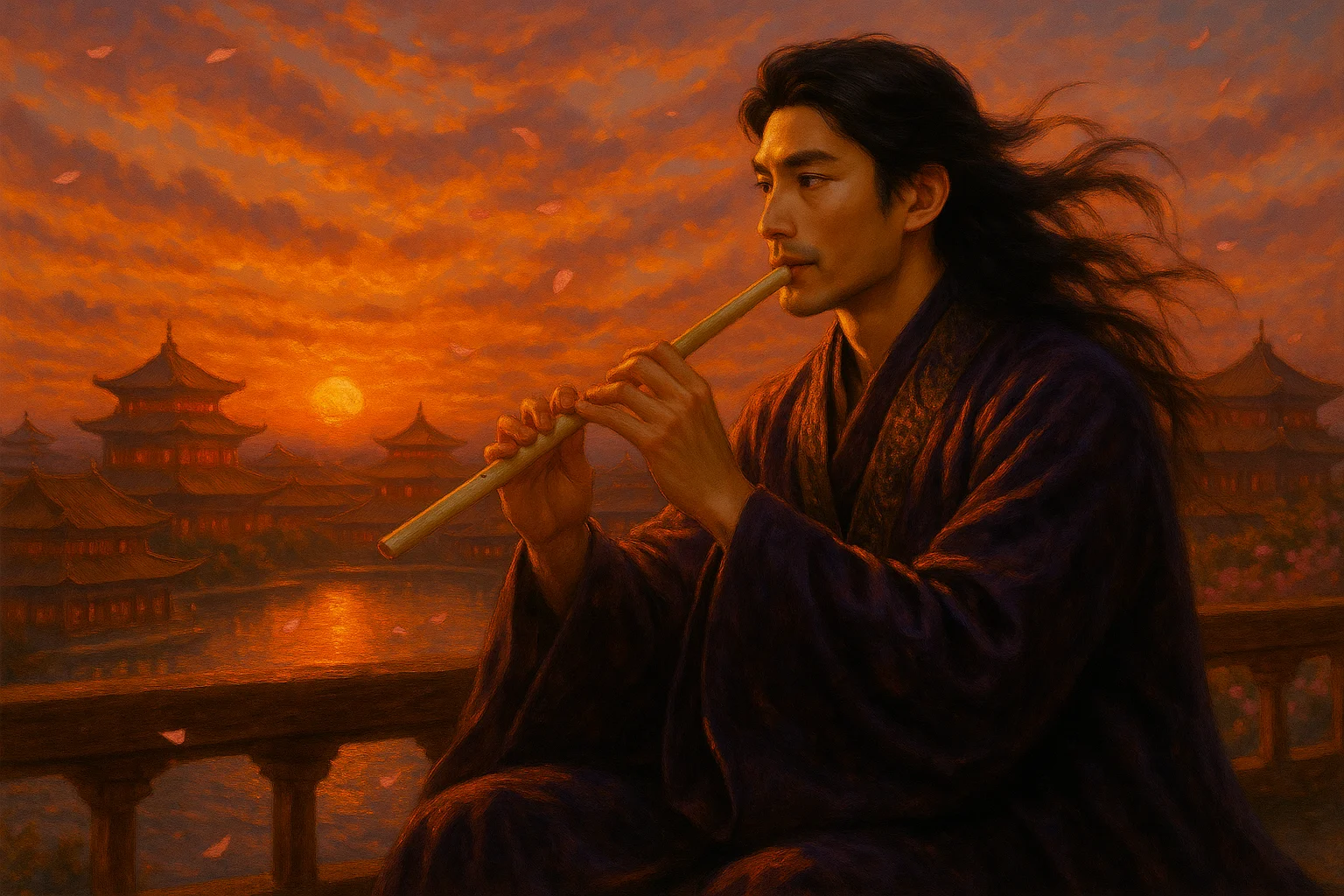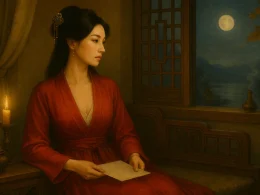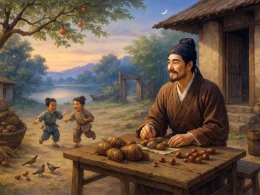After swallows and wild geese, orioles take flight;
Counting life’s fleeting threads, I’m lost in their maze.
How much longer than spring dreams can joy last?
Gone like autumn clouds without a trace.
Even immortal mates who played zithers and gave pendants of jade,
Could not be kept though their silk sleeves were torn.
Don’t be the only sober man, I pray!
Get drunk among flowers you should have sworn.
Original Poem
「木兰花 · 燕鸿过后莺归去」
晏殊
燕鸿过后莺归去,细算浮生千万绪。
长于春梦几多时?散似秋云无觅处。
闻琴解佩神仙侣,挽断罗衣留不住。
劝君莫作独醒人,烂醉花间应有数。
Interpretation
This lyric was composed in 1043 during Yan Shu's dismissal as chancellor, against the backdrop of the failed Qingli Reforms. As both prime minister and head of the military bureau, Yan Shu had gathered brilliant talents like Fan Zhongyan and Ouyang Xiu, but political intrigues ultimately led to their collective downfall. While ostensibly about fleeting youth and love, the poem deeply mourns the dispersal of worthy talents and the collapse of political ideals.
First Stanza: "燕鸿过后莺归去,细算浮生千万绪。长于春梦几多时?散似秋云无觅处。"
Yàn hóng guò hòu yīng guī qù, xì suàn fúshēng qiānwàn xù. Cháng yú chūnmèng jǐ duō shí? Sàn sì qiū yún wú mì chù.
Swallows and wild geese depart, orioles take leave - spring's chorus fades. / Measuring life's brief span, a thousand sorrows multiply. / What lasts longer than a spring dream's span? / All vanishes like autumn clouds without a trace.
The stanza masterfully intertwines natural imagery with existential contemplation. Migratory birds symbolize both seasonal change and political exile, while "spring dreams" and "autumn clouds" become potent metaphors for the transience of power and companionship. The precise imagery builds toward a profound meditation on impermanence.
Second Stanza: "闻琴解佩神仙侣,挽断罗衣留不住。劝君莫作独醒人,烂醉花间应有数。"
Wén qín jiě pèi shénxiān lǚ, wǎn duàn luóyī liú bù zhù. Quàn jūn mò zuò dú xǐng rén, làn zuì huā jiān yīng yǒu shù.
Those legendary lovers with their lute songs and jade gifts - / Even if you tear your silken sleeves, they cannot be detained. / Why be the lone soul sober amidst this revelry? / Better to drown in wine amidst the flowers while we may.
The allusions to Zhu Wenjun and goddesses surface romantic ideals, but the torn sleeves reveal desperate political struggles. The concluding advice - to choose drunken oblivion over clear-eyed suffering - echoes Zhuangzi's philosophy while reflecting Yan Shu's own political disillusionment. The "lone soul sober" suggests the poet's painful awareness amidst general complacency.
Holistic Appreciation
This lyric poem progresses from the superficial to the profound, from scenery to emotion, gradually elevating reflections on springtime and love into philosophical meditations on life’s brevity and the shattering of ideals. The first stanza laments the passing of spring and youth, its sentiment lingering yet restrained; the second stanza employs immortal lore to evoke the impermanence of worldly affairs and the vicissitudes of human fate, blending somber tones with impassioned undertones. It concludes with "drunken revelry among flowers," not as frivolous indulgence but as self-mocking escape after profound grief. Though seemingly graceful and subtle, the poem harbors sharp realism—its emotional undulations reveal the fracture of ideals and the vast desolation of human existence.
Artistic Merits
- Allusions Fused with Reason and Emotion: References to Zhuo Wenjun "hearing the zither" and the Xiang River goddess "unfastening her pendant" enhance classical elegance while concretizing and typifying emotional expression.
- Romance as Allegory, Blending Reality and Illusion: While ostensibly about love, the poem allegorizes political disillusionment, showcasing Yan Shu’s masterful style and layered intent.
- Tight Structure, Emotional Progression: From spring scenery to inner turmoil, from personal melancholy to shattered aspirations, the poem’s trajectory is clear yet dynamic.
- Refined Language, Profound Meaning: Though gently worded, it conceals sharpness within softness, revealing deep insights into life and politics.
Insights
More than mourning lost youth, this poem pierces into life’s helplessness and the anguish of political ideals undone. Amidst storms and uncertainty, the poet chooses "drunkenness" over "sobriety," flowers over the mortal world—a reminder to cherish beauty yet remain clear-eyed. For modern readers, it is a timeless warning: life is fleeting, the world is fraught, and only by living with sincerity and fervor in our limited years can we truly honor this existence.
Poem Translator
Xu Yuanchong (许渊冲)
About the Poet

Yan Shu (晏殊 991 – 1055) Originaire de Fuzhou dans le Jiangxi, Yan Shu fut le maître fondateur de l'école wanyue (élégante et retenue) de la poésie ci sous les Song du Nord. Enfant prodige entré dans l'administration à quatorze ans, ses ci allient noblesse classique et méditation philosophique dissimulée sous des évocations de prospérité raffinée. Mentor de talents comme Fan Zhongyan et Ouyang Xiu, il initia l'École du Jiangxi en poésie ci et posa les bases de l'épuration du genre sous les Song.












